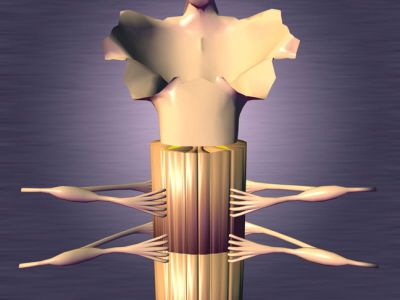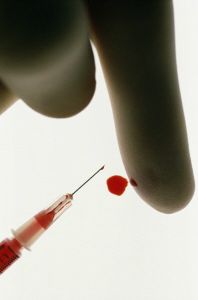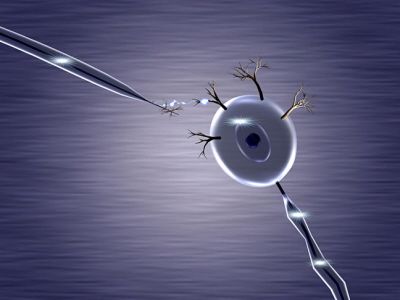Nerve Pain
What is Nerve Pain?
 |
Nerve pain, or medically speaking neuropathy, or neuropathic pain, is pain that is primarily caused by damage to one or more nerves. Nerve pain is usually sharp, like a knife or a lightning bolt and can be accompanied by tingling and numbness. The skin can become very sensitive to touch, and there can be local swelling and weakness in the painful area.
What Causes Nerve Pain?
Common causes of nerve pain are diabetes, shingles or viral infections, nerve compression by repetitive use such as in carpal tunnel syndrome, direct damage to nerves by trauma or surgery, or damage to nerve by toxins in the body such as alcohol, chemotherapy drugs, or environmental exposure. There can be a long time period between exposure to the toxin and development of nerve pain. Many times the source of the neuropathy is never found, and doctors call that idiopathic neuropathy.
Can Nerves heal themselves?
Yes, nerves outside the brain and spinal cord can regrow. However, the healing process is slow, and unpredictable. For example, if you have had surgery, you may have a permanent numb area around the incision. Most doctors will say nerve healing can take up to a year, and that can be frustrating. Part of the healing process is to remove the source of damage, and that may mean wearing splints, controlling blood sugar, stopping alcohol, or surgery to remove pressure on the nerve.
What is Carpal Tunnel Syndrome?
Carpal tunnel syndrome is a common type of nerve pain in todays computer oriented world. Symptoms include sharp pain or burning pain, numbness and tingling in the thumb and middle fingers, and may even go up the arm toward the elbow. Carpal tunnel syndrome may be caused by repetitive activity such as typing on a keyboard, knitting, suing power tools which can cause pressure on the median nerve as it travels through the wrist, and this causes the symptoms. Carpal tunnel syndrome treatment includes wearing night splints, physical therapy, medications, nerve block injections with cortisone and nerve entrapment release surgery. Commonly carpal tunnel syndrome is treated in the Work Comp System as it is often occupationally related. Dr. Scott at Newport Pain Management accepts workmans comp patients.
What is Shingles?
The medical term for shingles is acute herpes zoster. Shingles symptoms are a red pustular skin rash that appears on half of the body, in a band or belt-like shape. The rash is often on the chest. But it can be found on any part of the body. You can get it on your forehead or stomach. Shingles is usually very painful. The shingles pain may start a few days before the rash appears. Most of the time, the pain slowly goes away over several weeks or months. For the most part, people with shingles have no pain or a little pain one year after the rash. If the pain does not go away, it is called postherpetic neuralgia. Only a small number of people get postherpetic neuralgia.

What Causes Shingles and Postherpetic Neuralgia?
Many people get chicken pox when they are children. Chicken pox is caused by a virus called varicella zoster. As the chicken pox heals, the varicella zoster virus "goes to sleep," but this shingles virus stays in your nerves near the spine your entire life. The virus can "wake up" and become active again when your immune system gets weak. Your immune system can get weak when you are stressed, like by an illness in the family, or as you get older. When the virus "wakes up," it starts to grow in the nerves, often causing shingles pain. When the virus moves to the skin, you break out in with the chicken pox in the area the nerve works. Doctors call this the shingles rash. You can infect a child or adult who has not had the chicken pox while pustules are present in the shingles rash.
What is Postherpetic Neuralgia Pain?
Postherpetic neuralgia is pain felt in the area of the original shingles rash more than a couple months after the original outbreak. Patients use words like sharp, electric-like jabs, burning, throbbing, and aching to describe the pain. Patients might also have terrible itching in the painful area. Some patients have very tender skin, called allodynia. This can make even the touch of clothing unbearable. Some patients feel a "sagging of the muscles" which might be caused by damage to some nerves in the area of the shingles. Dr. Scott at Newport Pain Management can work with you to help with your shingles pain.
What is Diabetic Neuropathy?
 |
Diabetes may be associated with nerve pain in various areas of the body. Most often, diabetes is associated with the gradual onset of painful burning in the feet. Many diabetics describe difficulty walking on certain floors, like the shower, and a feeling that they are walking on marbles. Just placing bedsheets over the feet can be painful. This type of foot pain is known as a chronic sensorimotor polyneuropathy.
The diabetic may also have pain in the abdomen or trunk. This is known as a thoracoabdominal neuropathy. Painful conditions of a single nerve, known as a mononeuropathy, can occur as well, with the most common nerve being the one that moves the eye muscles. Almost all forms of diabetic nerve pain tend to be worse at night.
What is the cause of diabetic nerve pain?
There are many theories as to the exact cellular mechanism of diabetic nerve pain, but all basically agree that high blood sugar causes changes in the body that then cause damage to the nerve cell as well as the surrounding small blood vessels. Thus getting control of your blood sugar is important to reduce the long term damage to the nerves.
Nerve Pain Treatments
 |
Fortunately, there are treatments for neuropathic pain. If you have diabetic nerve pain, it is important to first get tight blood sugar control to prevent further nerve damage. In many cases, neuropathic pain treatment typically starts off with an anti-inflammatory agent. Caution is the word here, however, as NSAID medications are prone to cause cause ulcers, kidney and heart problems. The next line of medications depends on the type of pain. Epilepsy medications such as gabapentin (Gralise), pregabalin (Lyrica) help reduce sharp pain. Typically antidepressants such as Cymbalta help burning pain. Narcotic medications are controversial, because while they may provide short term pain reduction, they can be addictive and in some cases even make the pain worse. There are medications with low risk off such problems such as tramadol, which comes in many forms to fit your needs. Topical medications such as Lidoderm patches, EMLA, and capsaicin can help. No medication is curative, and side effects such as sleepiness are common with most pain medications. It is important to have a pain specialist guide you through the medication maze. A specific nerve block injection can be performed by a pain doctor, and this type of interventional neuropathy treatment can provide much needed pain relief. Let pain doctor H Rand Scott MD at Newport Pain Management help you with diabetic nerve pain, shingles treatment or neuropathy treatment.
Call for an appointment today
949.759.8400
Newport Pain Management
The information on this website is not intended to be a substitute for professional medical advice. You should not use this information to diagnose or treat a health problem or disease without consulting with the Pain Doctor's at Newport Pain Management Medical Corporation or a qualified healthcare provider. Please consult your healthcare provider with any questions or concerns you may have regarding your condition.
Main Navigation
Diabetic Neuropathy.docx
22.0 KB
Diabetic Pain.docx
12.2 KB
Elbow_ Wrist and Hands.docx
17.2 KB
Antiarrhythmics and Anticonvulsants for Pain Control.docx
14.5 KB
Post Herpetic Neuralgia FAQS.doc
37.5 KB
Shingles-When the Pain Stays.docx
14.2 KB
What are Pain Blocks.docx
15.9 KB
What Is Carpal Tunnel Syndrome.docx
14.7 KB
